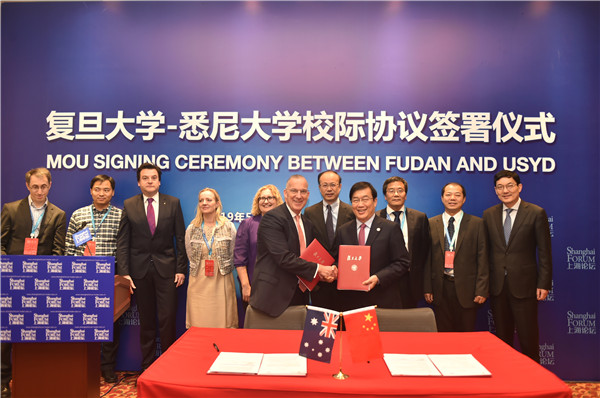Universities join forces to forge new scientific alliance


The University of Sydney and Fudan University on May 25 signed a memorandum of understanding to form the Brain and Intelligence Science Alliance aimed at fostering greater levels of cooperation in data science, neuroscience and artificial intelligence.
Academic panels from the two universities would also evaluate joint research and education projects before allocating funding to them.
"We need to work across disciplines and across oceans if our research is going to improve lives," says Michael Spence, the vice-chancellor of the University of Sydney.
"The challenges of brain disorders, computational neuroscience and the ethics of artificial intelligence can only be addressed if we get the sharpest minds working on solutions. That's why we are working with Fudan University on this important research."
Spence, who signed the memorandum on the sidelines of the Shanghai Forum 2019, which was co-hosted by Fudan University and the Korea Foundation for Advanced Studies, says that it is important to expand research into cognitive neuroscience and brain disorders since dementia has become one of the deadliest disorders of today.
"This disease has enormous social and economic consequences. As we grow older, neurodegenerative disorders are going to become more and more of a pressing social issue," he says.
"These diseases also put pressure on families who have to look after children and old people at the same time. We're beginning to understand the basic mechanisms of diseases like Alzheimer's much better than before and there's a real possibility of great advances in this area."
Further study into the disease will also benefit China. According to the University of Sydney, China is home to more than 20 percent of the world's patients with dementia. Strokes are the leading cause of death in the country as well.
Spence also spoke of the implications that the AI age would have on education, saying that the traditional education model needs to change if graduates are to be armed with the right skills that are required by a workforce transformed by technology.
"Broadly speaking, students will need deep disciplinary expertise, critical thinking skills and a multidisciplinary perspective," says Spence.
"In terms of being knowledgeable in multiple disciplines, we've made it possible for students to combine subjects from anywhere in the university. It's also important to have an international perspective. As such, we ensure that at least 50 percent of our students spend part of degrees overseas. We are currently working with companies and civil society organizations in Australia, China, India, the UK and Europe which provide our students with real problems that they can work on."
Schools will also have to embrace technology to stay ahead of the curve, adds Spence. For example, the University of Sydney has developed a program that enables educators to analyze the students' performance and identify those who require remedial classes.
He notes that AI is being used by other educational institutions as well to improve student welfare by determining at-risk individuals so that they can be provided with prompt assistance.
Spence points out, too, that it is unlikely that teachers could be replaced by robots in the future, or that education would become exclusively virtual.
"Ten or 15 years ago everybody was saying that universities would become obsolete, that everyone would be doing online courses. But we are very embodied people-nobody wants to roll out of bed in the morning and do their degrees on their computer. People still want the campus experience. Students still want interaction with real human beings," he says.
"In this AI age, soft skills, interpersonal skills and cross-cultural skills are going to be much more important because these are things that computers cannot do. These are skills that you can only get from a rich, on-campus experience."





































